MGT100 - Individual Assessment 1: Corporate Social Responsibility
VerifiedAdded on 2022/07/28
|10
|2589
|28
Essay
AI Summary
This essay, written for an Introduction to Management course (MGT100), provides a comprehensive overview of Corporate Social Responsibility (CSR) and its pivotal role in contemporary management and business practices. The essay begins with an introduction defining CSR and its significance, followed by a literature review that delves into CSR theories, including Corporate Social Responsibility theory, the triple bottom line theory, and stakeholder theory. It then discusses the practical roles of CSR, such as environmental protection, employee safety, social responsibility, customer relationships, upholding human rights, conservation of natural resources, employee motivation, increasing profitability, building public relations, fostering relationships with the government, and creating a positive workplace environment. The essay concludes by emphasizing the multifaceted benefits of CSR, which include cost savings, enhanced brand perception, increased employee loyalty, and a stronger overall business performance. The essay adheres to academic writing standards, incorporating at least five reliable sources to support its arguments.

Running head
Executive summary
The report is based on the roles that CSR plays in contemporary management and business practices. It
begins with an introduction which is a detailed overview of what CSR entails. This is then followed by a
literature review that covers the CSR theories and the specific roles that CSR plays in corporations. This
is then followed by a conclusion on what was deduced in the report and finally is a list of references from
where the information was sourced.
Executive summary
The report is based on the roles that CSR plays in contemporary management and business practices. It
begins with an introduction which is a detailed overview of what CSR entails. This is then followed by a
literature review that covers the CSR theories and the specific roles that CSR plays in corporations. This
is then followed by a conclusion on what was deduced in the report and finally is a list of references from
where the information was sourced.
Paraphrase This Document
Need a fresh take? Get an instant paraphrase of this document with our AI Paraphraser

Introduction to management
2
Table of Contents
Executive summary.....................................................................................................................................1
Introduction.................................................................................................................................................3
Literature review.........................................................................................................................................4
CSR Theories..........................................................................................................................................4
Roles of CSR in contemporary management and business practice.............................................................5
Conclusion...................................................................................................................................................9
References.................................................................................................................................................10
2
Table of Contents
Executive summary.....................................................................................................................................1
Introduction.................................................................................................................................................3
Literature review.........................................................................................................................................4
CSR Theories..........................................................................................................................................4
Roles of CSR in contemporary management and business practice.............................................................5
Conclusion...................................................................................................................................................9
References.................................................................................................................................................10
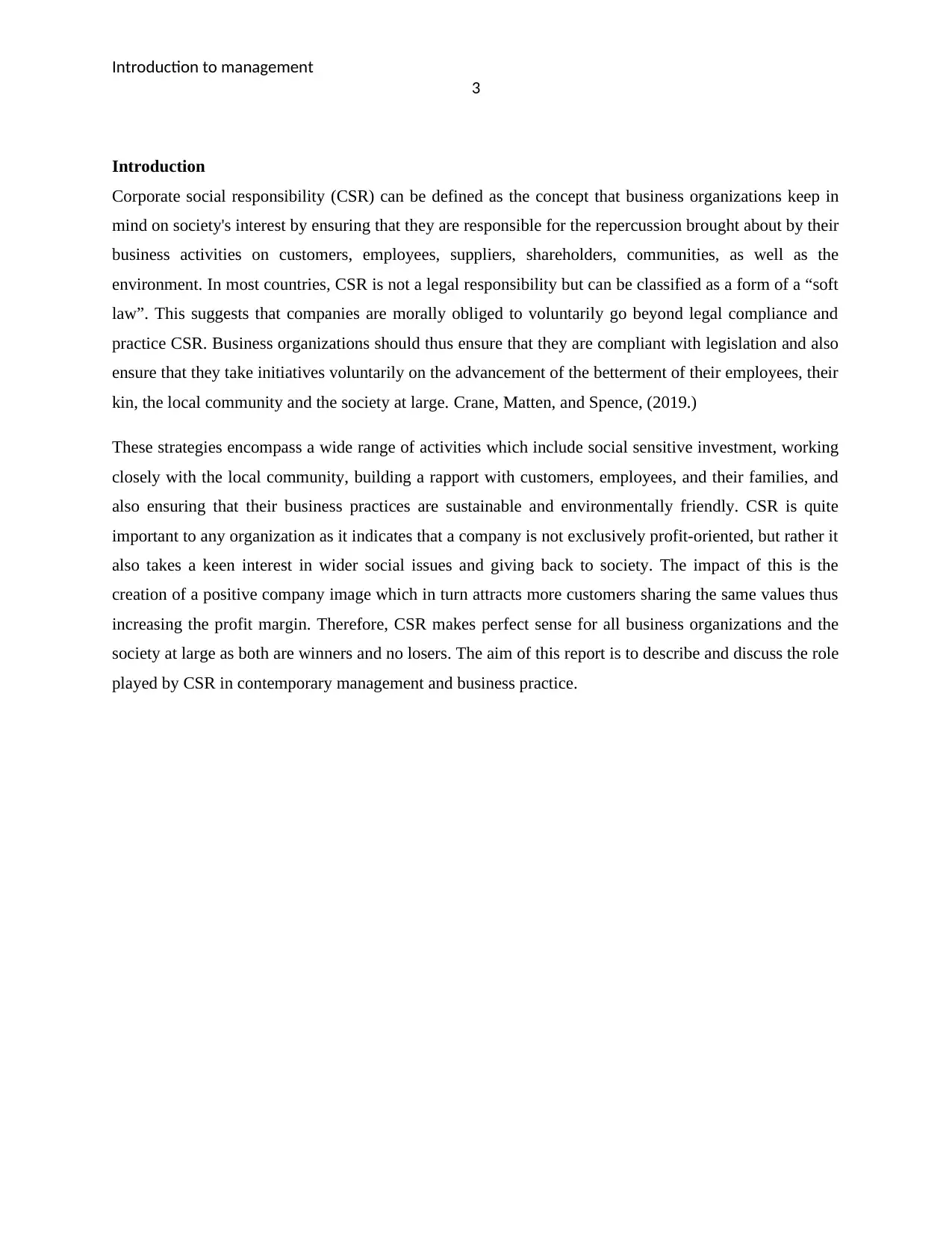
Introduction to management
3
Introduction
Corporate social responsibility (CSR) can be defined as the concept that business organizations keep in
mind on society's interest by ensuring that they are responsible for the repercussion brought about by their
business activities on customers, employees, suppliers, shareholders, communities, as well as the
environment. In most countries, CSR is not a legal responsibility but can be classified as a form of a “soft
law”. This suggests that companies are morally obliged to voluntarily go beyond legal compliance and
practice CSR. Business organizations should thus ensure that they are compliant with legislation and also
ensure that they take initiatives voluntarily on the advancement of the betterment of their employees, their
kin, the local community and the society at large. Crane, Matten, and Spence, (2019.)
These strategies encompass a wide range of activities which include social sensitive investment, working
closely with the local community, building a rapport with customers, employees, and their families, and
also ensuring that their business practices are sustainable and environmentally friendly. CSR is quite
important to any organization as it indicates that a company is not exclusively profit-oriented, but rather it
also takes a keen interest in wider social issues and giving back to society. The impact of this is the
creation of a positive company image which in turn attracts more customers sharing the same values thus
increasing the profit margin. Therefore, CSR makes perfect sense for all business organizations and the
society at large as both are winners and no losers. The aim of this report is to describe and discuss the role
played by CSR in contemporary management and business practice.
3
Introduction
Corporate social responsibility (CSR) can be defined as the concept that business organizations keep in
mind on society's interest by ensuring that they are responsible for the repercussion brought about by their
business activities on customers, employees, suppliers, shareholders, communities, as well as the
environment. In most countries, CSR is not a legal responsibility but can be classified as a form of a “soft
law”. This suggests that companies are morally obliged to voluntarily go beyond legal compliance and
practice CSR. Business organizations should thus ensure that they are compliant with legislation and also
ensure that they take initiatives voluntarily on the advancement of the betterment of their employees, their
kin, the local community and the society at large. Crane, Matten, and Spence, (2019.)
These strategies encompass a wide range of activities which include social sensitive investment, working
closely with the local community, building a rapport with customers, employees, and their families, and
also ensuring that their business practices are sustainable and environmentally friendly. CSR is quite
important to any organization as it indicates that a company is not exclusively profit-oriented, but rather it
also takes a keen interest in wider social issues and giving back to society. The impact of this is the
creation of a positive company image which in turn attracts more customers sharing the same values thus
increasing the profit margin. Therefore, CSR makes perfect sense for all business organizations and the
society at large as both are winners and no losers. The aim of this report is to describe and discuss the role
played by CSR in contemporary management and business practice.
⊘ This is a preview!⊘
Do you want full access?
Subscribe today to unlock all pages.

Trusted by 1+ million students worldwide
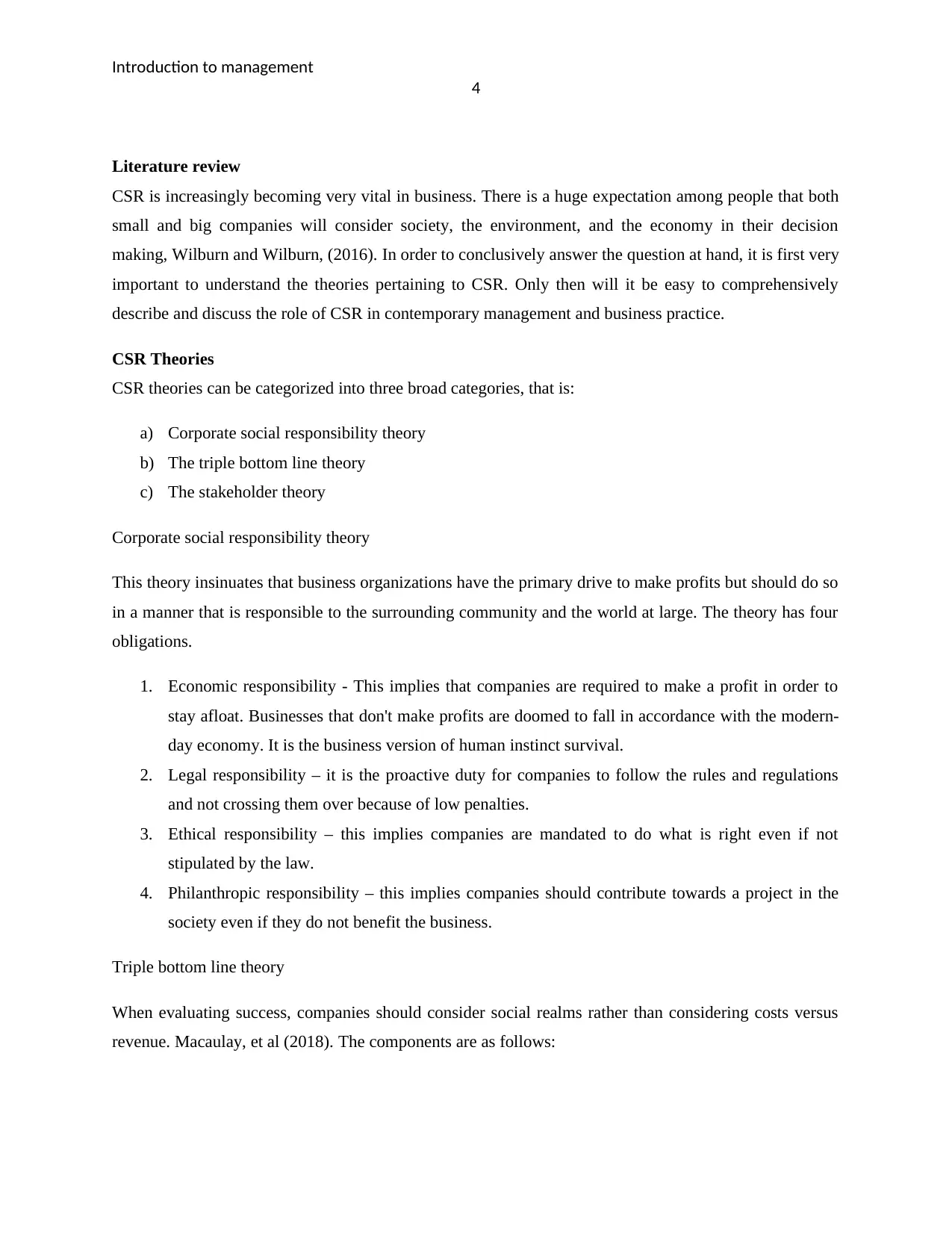
Introduction to management
4
Literature review
CSR is increasingly becoming very vital in business. There is a huge expectation among people that both
small and big companies will consider society, the environment, and the economy in their decision
making, Wilburn and Wilburn, (2016). In order to conclusively answer the question at hand, it is first very
important to understand the theories pertaining to CSR. Only then will it be easy to comprehensively
describe and discuss the role of CSR in contemporary management and business practice.
CSR Theories
CSR theories can be categorized into three broad categories, that is:
a) Corporate social responsibility theory
b) The triple bottom line theory
c) The stakeholder theory
Corporate social responsibility theory
This theory insinuates that business organizations have the primary drive to make profits but should do so
in a manner that is responsible to the surrounding community and the world at large. The theory has four
obligations.
1. Economic responsibility - This implies that companies are required to make a profit in order to
stay afloat. Businesses that don't make profits are doomed to fall in accordance with the modern-
day economy. It is the business version of human instinct survival.
2. Legal responsibility – it is the proactive duty for companies to follow the rules and regulations
and not crossing them over because of low penalties.
3. Ethical responsibility – this implies companies are mandated to do what is right even if not
stipulated by the law.
4. Philanthropic responsibility – this implies companies should contribute towards a project in the
society even if they do not benefit the business.
Triple bottom line theory
When evaluating success, companies should consider social realms rather than considering costs versus
revenue. Macaulay, et al (2018). The components are as follows:
4
Literature review
CSR is increasingly becoming very vital in business. There is a huge expectation among people that both
small and big companies will consider society, the environment, and the economy in their decision
making, Wilburn and Wilburn, (2016). In order to conclusively answer the question at hand, it is first very
important to understand the theories pertaining to CSR. Only then will it be easy to comprehensively
describe and discuss the role of CSR in contemporary management and business practice.
CSR Theories
CSR theories can be categorized into three broad categories, that is:
a) Corporate social responsibility theory
b) The triple bottom line theory
c) The stakeholder theory
Corporate social responsibility theory
This theory insinuates that business organizations have the primary drive to make profits but should do so
in a manner that is responsible to the surrounding community and the world at large. The theory has four
obligations.
1. Economic responsibility - This implies that companies are required to make a profit in order to
stay afloat. Businesses that don't make profits are doomed to fall in accordance with the modern-
day economy. It is the business version of human instinct survival.
2. Legal responsibility – it is the proactive duty for companies to follow the rules and regulations
and not crossing them over because of low penalties.
3. Ethical responsibility – this implies companies are mandated to do what is right even if not
stipulated by the law.
4. Philanthropic responsibility – this implies companies should contribute towards a project in the
society even if they do not benefit the business.
Triple bottom line theory
When evaluating success, companies should consider social realms rather than considering costs versus
revenue. Macaulay, et al (2018). The components are as follows:
Paraphrase This Document
Need a fresh take? Get an instant paraphrase of this document with our AI Paraphraser
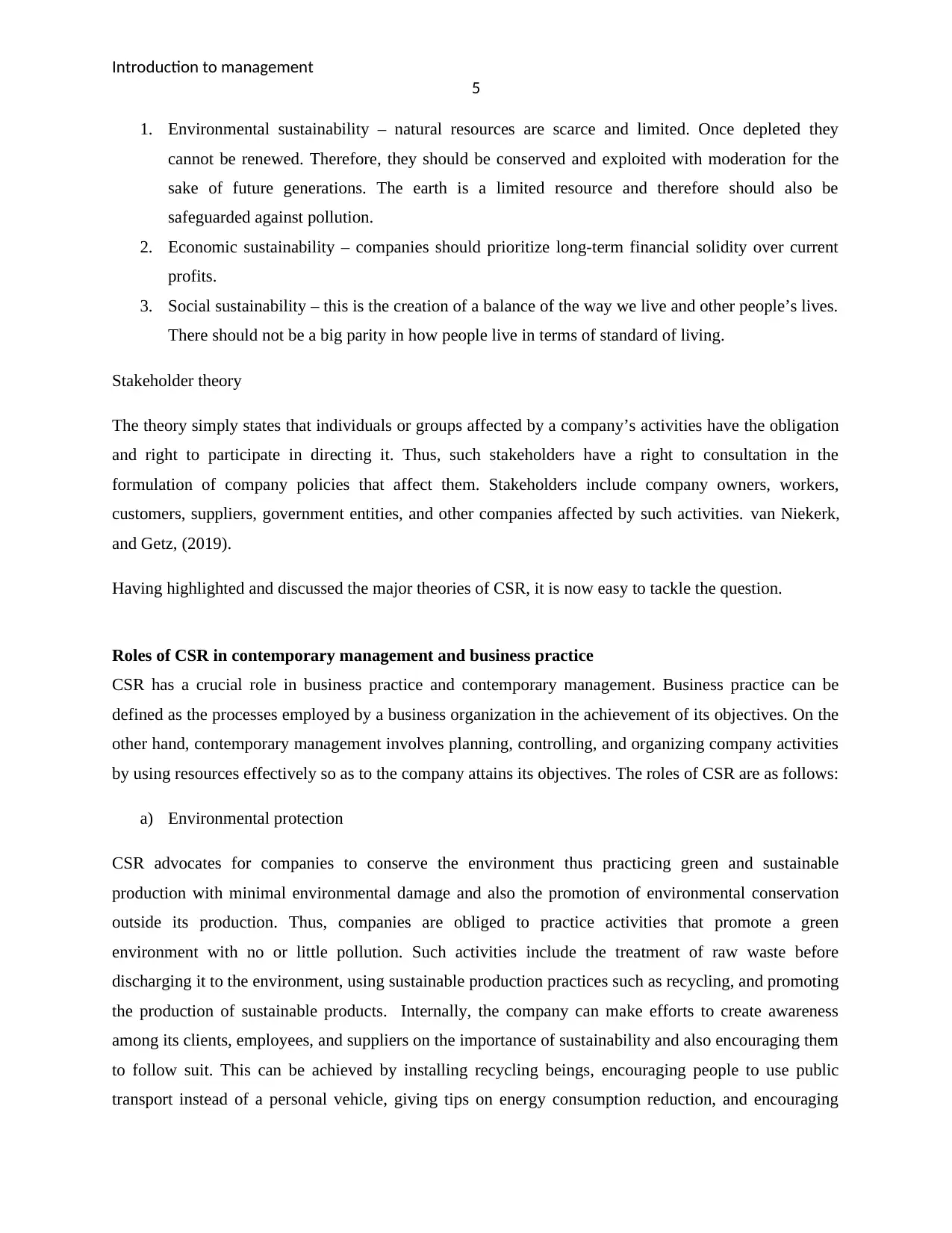
Introduction to management
5
1. Environmental sustainability – natural resources are scarce and limited. Once depleted they
cannot be renewed. Therefore, they should be conserved and exploited with moderation for the
sake of future generations. The earth is a limited resource and therefore should also be
safeguarded against pollution.
2. Economic sustainability – companies should prioritize long-term financial solidity over current
profits.
3. Social sustainability – this is the creation of a balance of the way we live and other people’s lives.
There should not be a big parity in how people live in terms of standard of living.
Stakeholder theory
The theory simply states that individuals or groups affected by a company’s activities have the obligation
and right to participate in directing it. Thus, such stakeholders have a right to consultation in the
formulation of company policies that affect them. Stakeholders include company owners, workers,
customers, suppliers, government entities, and other companies affected by such activities. van Niekerk,
and Getz, (2019).
Having highlighted and discussed the major theories of CSR, it is now easy to tackle the question.
Roles of CSR in contemporary management and business practice
CSR has a crucial role in business practice and contemporary management. Business practice can be
defined as the processes employed by a business organization in the achievement of its objectives. On the
other hand, contemporary management involves planning, controlling, and organizing company activities
by using resources effectively so as to the company attains its objectives. The roles of CSR are as follows:
a) Environmental protection
CSR advocates for companies to conserve the environment thus practicing green and sustainable
production with minimal environmental damage and also the promotion of environmental conservation
outside its production. Thus, companies are obliged to practice activities that promote a green
environment with no or little pollution. Such activities include the treatment of raw waste before
discharging it to the environment, using sustainable production practices such as recycling, and promoting
the production of sustainable products. Internally, the company can make efforts to create awareness
among its clients, employees, and suppliers on the importance of sustainability and also encouraging them
to follow suit. This can be achieved by installing recycling beings, encouraging people to use public
transport instead of a personal vehicle, giving tips on energy consumption reduction, and encouraging
5
1. Environmental sustainability – natural resources are scarce and limited. Once depleted they
cannot be renewed. Therefore, they should be conserved and exploited with moderation for the
sake of future generations. The earth is a limited resource and therefore should also be
safeguarded against pollution.
2. Economic sustainability – companies should prioritize long-term financial solidity over current
profits.
3. Social sustainability – this is the creation of a balance of the way we live and other people’s lives.
There should not be a big parity in how people live in terms of standard of living.
Stakeholder theory
The theory simply states that individuals or groups affected by a company’s activities have the obligation
and right to participate in directing it. Thus, such stakeholders have a right to consultation in the
formulation of company policies that affect them. Stakeholders include company owners, workers,
customers, suppliers, government entities, and other companies affected by such activities. van Niekerk,
and Getz, (2019).
Having highlighted and discussed the major theories of CSR, it is now easy to tackle the question.
Roles of CSR in contemporary management and business practice
CSR has a crucial role in business practice and contemporary management. Business practice can be
defined as the processes employed by a business organization in the achievement of its objectives. On the
other hand, contemporary management involves planning, controlling, and organizing company activities
by using resources effectively so as to the company attains its objectives. The roles of CSR are as follows:
a) Environmental protection
CSR advocates for companies to conserve the environment thus practicing green and sustainable
production with minimal environmental damage and also the promotion of environmental conservation
outside its production. Thus, companies are obliged to practice activities that promote a green
environment with no or little pollution. Such activities include the treatment of raw waste before
discharging it to the environment, using sustainable production practices such as recycling, and promoting
the production of sustainable products. Internally, the company can make efforts to create awareness
among its clients, employees, and suppliers on the importance of sustainability and also encouraging them
to follow suit. This can be achieved by installing recycling beings, encouraging people to use public
transport instead of a personal vehicle, giving tips on energy consumption reduction, and encouraging
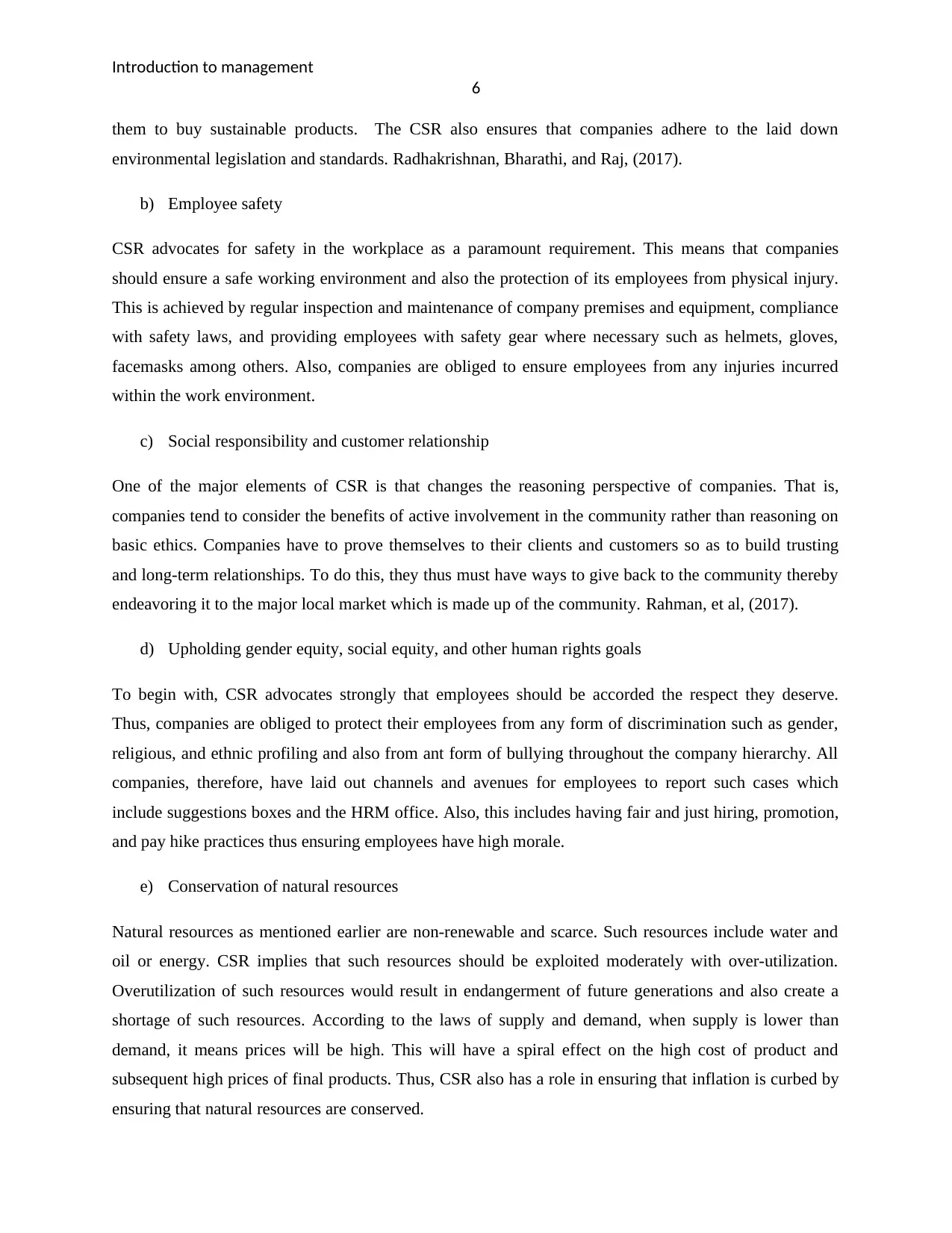
Introduction to management
6
them to buy sustainable products. The CSR also ensures that companies adhere to the laid down
environmental legislation and standards. Radhakrishnan, Bharathi, and Raj, (2017).
b) Employee safety
CSR advocates for safety in the workplace as a paramount requirement. This means that companies
should ensure a safe working environment and also the protection of its employees from physical injury.
This is achieved by regular inspection and maintenance of company premises and equipment, compliance
with safety laws, and providing employees with safety gear where necessary such as helmets, gloves,
facemasks among others. Also, companies are obliged to ensure employees from any injuries incurred
within the work environment.
c) Social responsibility and customer relationship
One of the major elements of CSR is that changes the reasoning perspective of companies. That is,
companies tend to consider the benefits of active involvement in the community rather than reasoning on
basic ethics. Companies have to prove themselves to their clients and customers so as to build trusting
and long-term relationships. To do this, they thus must have ways to give back to the community thereby
endeavoring it to the major local market which is made up of the community. Rahman, et al, (2017).
d) Upholding gender equity, social equity, and other human rights goals
To begin with, CSR advocates strongly that employees should be accorded the respect they deserve.
Thus, companies are obliged to protect their employees from any form of discrimination such as gender,
religious, and ethnic profiling and also from ant form of bullying throughout the company hierarchy. All
companies, therefore, have laid out channels and avenues for employees to report such cases which
include suggestions boxes and the HRM office. Also, this includes having fair and just hiring, promotion,
and pay hike practices thus ensuring employees have high morale.
e) Conservation of natural resources
Natural resources as mentioned earlier are non-renewable and scarce. Such resources include water and
oil or energy. CSR implies that such resources should be exploited moderately with over-utilization.
Overutilization of such resources would result in endangerment of future generations and also create a
shortage of such resources. According to the laws of supply and demand, when supply is lower than
demand, it means prices will be high. This will have a spiral effect on the high cost of product and
subsequent high prices of final products. Thus, CSR also has a role in ensuring that inflation is curbed by
ensuring that natural resources are conserved.
6
them to buy sustainable products. The CSR also ensures that companies adhere to the laid down
environmental legislation and standards. Radhakrishnan, Bharathi, and Raj, (2017).
b) Employee safety
CSR advocates for safety in the workplace as a paramount requirement. This means that companies
should ensure a safe working environment and also the protection of its employees from physical injury.
This is achieved by regular inspection and maintenance of company premises and equipment, compliance
with safety laws, and providing employees with safety gear where necessary such as helmets, gloves,
facemasks among others. Also, companies are obliged to ensure employees from any injuries incurred
within the work environment.
c) Social responsibility and customer relationship
One of the major elements of CSR is that changes the reasoning perspective of companies. That is,
companies tend to consider the benefits of active involvement in the community rather than reasoning on
basic ethics. Companies have to prove themselves to their clients and customers so as to build trusting
and long-term relationships. To do this, they thus must have ways to give back to the community thereby
endeavoring it to the major local market which is made up of the community. Rahman, et al, (2017).
d) Upholding gender equity, social equity, and other human rights goals
To begin with, CSR advocates strongly that employees should be accorded the respect they deserve.
Thus, companies are obliged to protect their employees from any form of discrimination such as gender,
religious, and ethnic profiling and also from ant form of bullying throughout the company hierarchy. All
companies, therefore, have laid out channels and avenues for employees to report such cases which
include suggestions boxes and the HRM office. Also, this includes having fair and just hiring, promotion,
and pay hike practices thus ensuring employees have high morale.
e) Conservation of natural resources
Natural resources as mentioned earlier are non-renewable and scarce. Such resources include water and
oil or energy. CSR implies that such resources should be exploited moderately with over-utilization.
Overutilization of such resources would result in endangerment of future generations and also create a
shortage of such resources. According to the laws of supply and demand, when supply is lower than
demand, it means prices will be high. This will have a spiral effect on the high cost of product and
subsequent high prices of final products. Thus, CSR also has a role in ensuring that inflation is curbed by
ensuring that natural resources are conserved.
⊘ This is a preview!⊘
Do you want full access?
Subscribe today to unlock all pages.

Trusted by 1+ million students worldwide
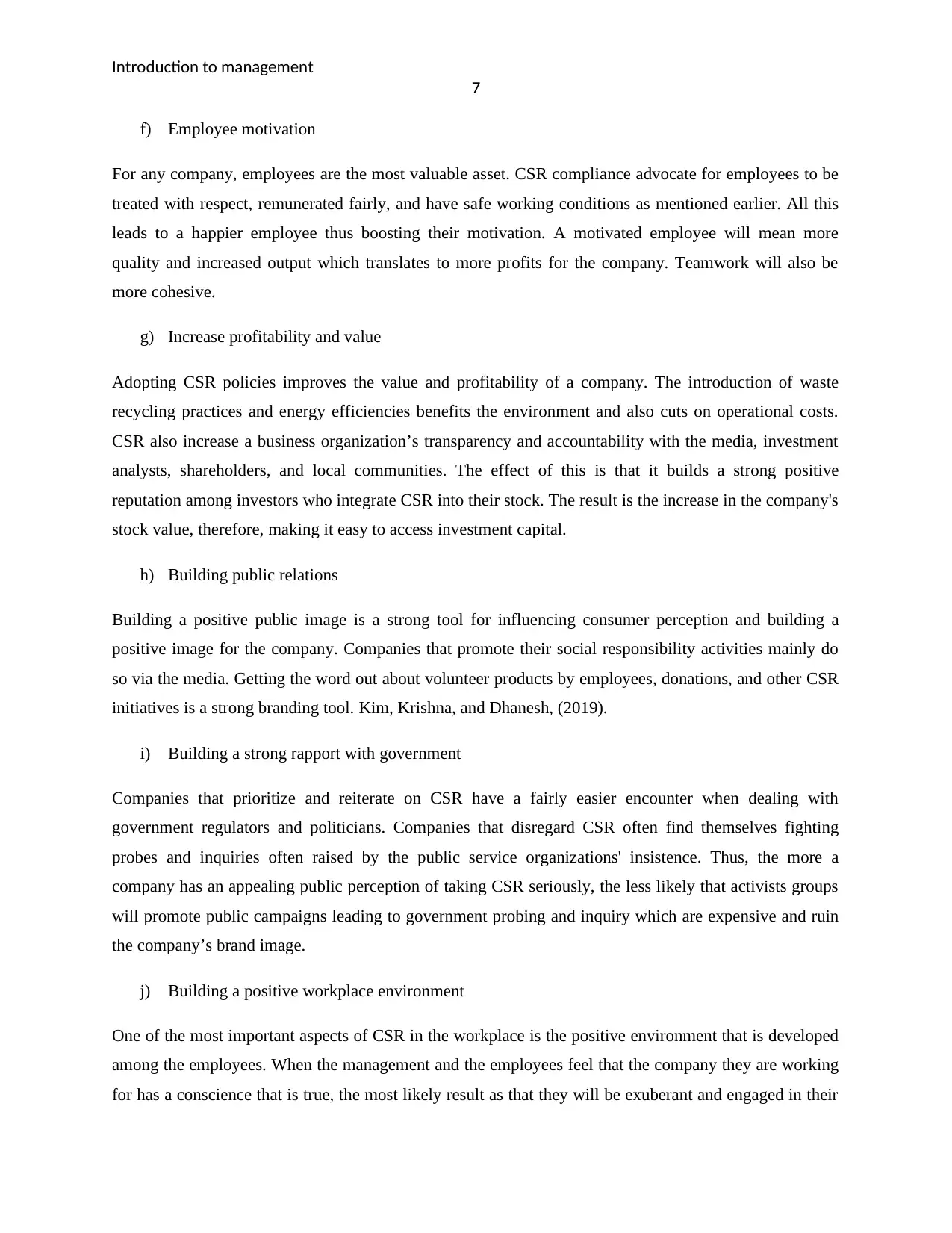
Introduction to management
7
f) Employee motivation
For any company, employees are the most valuable asset. CSR compliance advocate for employees to be
treated with respect, remunerated fairly, and have safe working conditions as mentioned earlier. All this
leads to a happier employee thus boosting their motivation. A motivated employee will mean more
quality and increased output which translates to more profits for the company. Teamwork will also be
more cohesive.
g) Increase profitability and value
Adopting CSR policies improves the value and profitability of a company. The introduction of waste
recycling practices and energy efficiencies benefits the environment and also cuts on operational costs.
CSR also increase a business organization’s transparency and accountability with the media, investment
analysts, shareholders, and local communities. The effect of this is that it builds a strong positive
reputation among investors who integrate CSR into their stock. The result is the increase in the company's
stock value, therefore, making it easy to access investment capital.
h) Building public relations
Building a positive public image is a strong tool for influencing consumer perception and building a
positive image for the company. Companies that promote their social responsibility activities mainly do
so via the media. Getting the word out about volunteer products by employees, donations, and other CSR
initiatives is a strong branding tool. Kim, Krishna, and Dhanesh, (2019).
i) Building a strong rapport with government
Companies that prioritize and reiterate on CSR have a fairly easier encounter when dealing with
government regulators and politicians. Companies that disregard CSR often find themselves fighting
probes and inquiries often raised by the public service organizations' insistence. Thus, the more a
company has an appealing public perception of taking CSR seriously, the less likely that activists groups
will promote public campaigns leading to government probing and inquiry which are expensive and ruin
the company’s brand image.
j) Building a positive workplace environment
One of the most important aspects of CSR in the workplace is the positive environment that is developed
among the employees. When the management and the employees feel that the company they are working
for has a conscience that is true, the most likely result as that they will be exuberant and engaged in their
7
f) Employee motivation
For any company, employees are the most valuable asset. CSR compliance advocate for employees to be
treated with respect, remunerated fairly, and have safe working conditions as mentioned earlier. All this
leads to a happier employee thus boosting their motivation. A motivated employee will mean more
quality and increased output which translates to more profits for the company. Teamwork will also be
more cohesive.
g) Increase profitability and value
Adopting CSR policies improves the value and profitability of a company. The introduction of waste
recycling practices and energy efficiencies benefits the environment and also cuts on operational costs.
CSR also increase a business organization’s transparency and accountability with the media, investment
analysts, shareholders, and local communities. The effect of this is that it builds a strong positive
reputation among investors who integrate CSR into their stock. The result is the increase in the company's
stock value, therefore, making it easy to access investment capital.
h) Building public relations
Building a positive public image is a strong tool for influencing consumer perception and building a
positive image for the company. Companies that promote their social responsibility activities mainly do
so via the media. Getting the word out about volunteer products by employees, donations, and other CSR
initiatives is a strong branding tool. Kim, Krishna, and Dhanesh, (2019).
i) Building a strong rapport with government
Companies that prioritize and reiterate on CSR have a fairly easier encounter when dealing with
government regulators and politicians. Companies that disregard CSR often find themselves fighting
probes and inquiries often raised by the public service organizations' insistence. Thus, the more a
company has an appealing public perception of taking CSR seriously, the less likely that activists groups
will promote public campaigns leading to government probing and inquiry which are expensive and ruin
the company’s brand image.
j) Building a positive workplace environment
One of the most important aspects of CSR in the workplace is the positive environment that is developed
among the employees. When the management and the employees feel that the company they are working
for has a conscience that is true, the most likely result as that they will be exuberant and engaged in their
Paraphrase This Document
Need a fresh take? Get an instant paraphrase of this document with our AI Paraphraser

Introduction to management
8
jobs. Thus, they will build a sense of teamwork and community which brings all parties together and also
results in increased productivity.
8
jobs. Thus, they will build a sense of teamwork and community which brings all parties together and also
results in increased productivity.
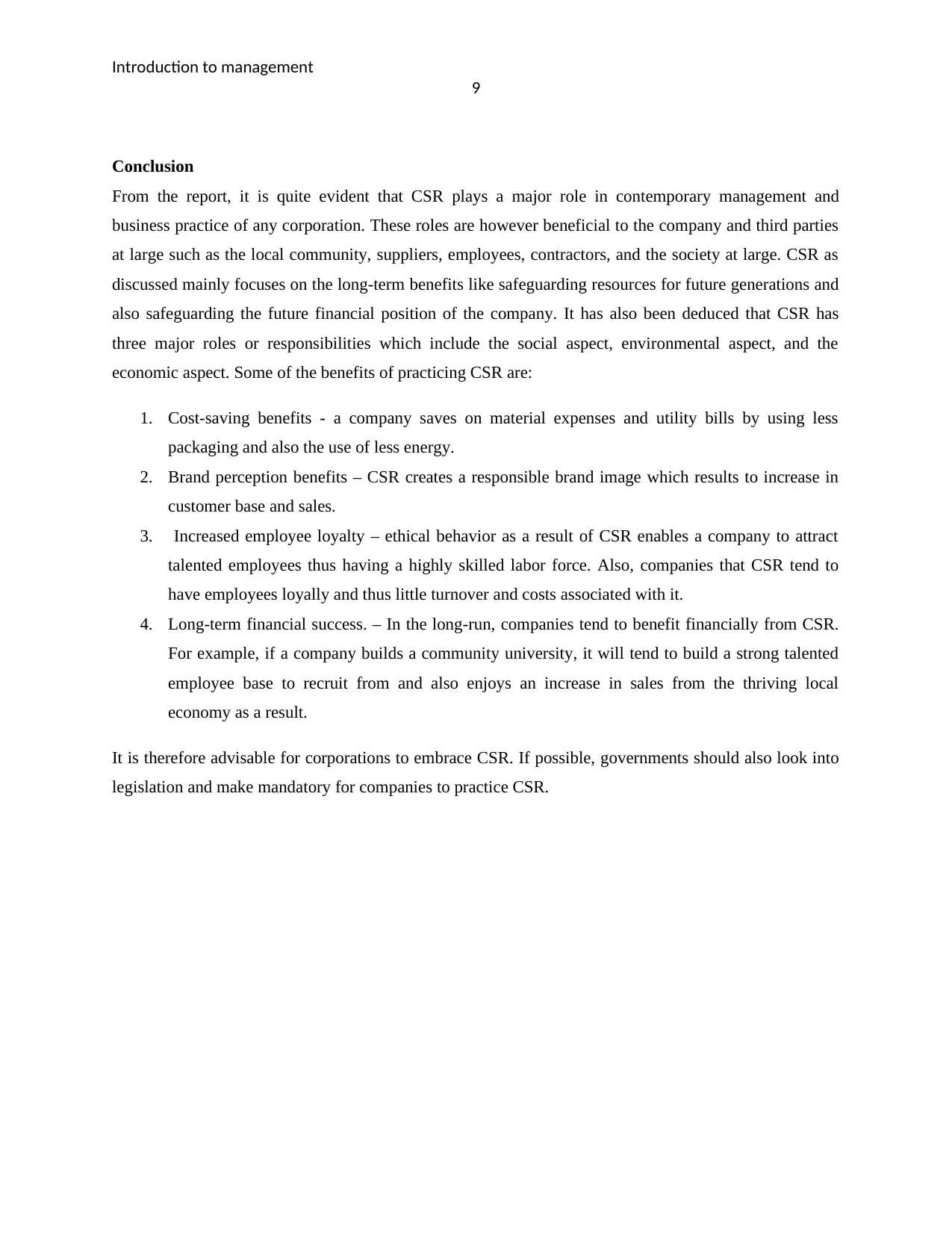
Introduction to management
9
Conclusion
From the report, it is quite evident that CSR plays a major role in contemporary management and
business practice of any corporation. These roles are however beneficial to the company and third parties
at large such as the local community, suppliers, employees, contractors, and the society at large. CSR as
discussed mainly focuses on the long-term benefits like safeguarding resources for future generations and
also safeguarding the future financial position of the company. It has also been deduced that CSR has
three major roles or responsibilities which include the social aspect, environmental aspect, and the
economic aspect. Some of the benefits of practicing CSR are:
1. Cost-saving benefits - a company saves on material expenses and utility bills by using less
packaging and also the use of less energy.
2. Brand perception benefits – CSR creates a responsible brand image which results to increase in
customer base and sales.
3. Increased employee loyalty – ethical behavior as a result of CSR enables a company to attract
talented employees thus having a highly skilled labor force. Also, companies that CSR tend to
have employees loyally and thus little turnover and costs associated with it.
4. Long-term financial success. – In the long-run, companies tend to benefit financially from CSR.
For example, if a company builds a community university, it will tend to build a strong talented
employee base to recruit from and also enjoys an increase in sales from the thriving local
economy as a result.
It is therefore advisable for corporations to embrace CSR. If possible, governments should also look into
legislation and make mandatory for companies to practice CSR.
9
Conclusion
From the report, it is quite evident that CSR plays a major role in contemporary management and
business practice of any corporation. These roles are however beneficial to the company and third parties
at large such as the local community, suppliers, employees, contractors, and the society at large. CSR as
discussed mainly focuses on the long-term benefits like safeguarding resources for future generations and
also safeguarding the future financial position of the company. It has also been deduced that CSR has
three major roles or responsibilities which include the social aspect, environmental aspect, and the
economic aspect. Some of the benefits of practicing CSR are:
1. Cost-saving benefits - a company saves on material expenses and utility bills by using less
packaging and also the use of less energy.
2. Brand perception benefits – CSR creates a responsible brand image which results to increase in
customer base and sales.
3. Increased employee loyalty – ethical behavior as a result of CSR enables a company to attract
talented employees thus having a highly skilled labor force. Also, companies that CSR tend to
have employees loyally and thus little turnover and costs associated with it.
4. Long-term financial success. – In the long-run, companies tend to benefit financially from CSR.
For example, if a company builds a community university, it will tend to build a strong talented
employee base to recruit from and also enjoys an increase in sales from the thriving local
economy as a result.
It is therefore advisable for corporations to embrace CSR. If possible, governments should also look into
legislation and make mandatory for companies to practice CSR.
⊘ This is a preview!⊘
Do you want full access?
Subscribe today to unlock all pages.

Trusted by 1+ million students worldwide
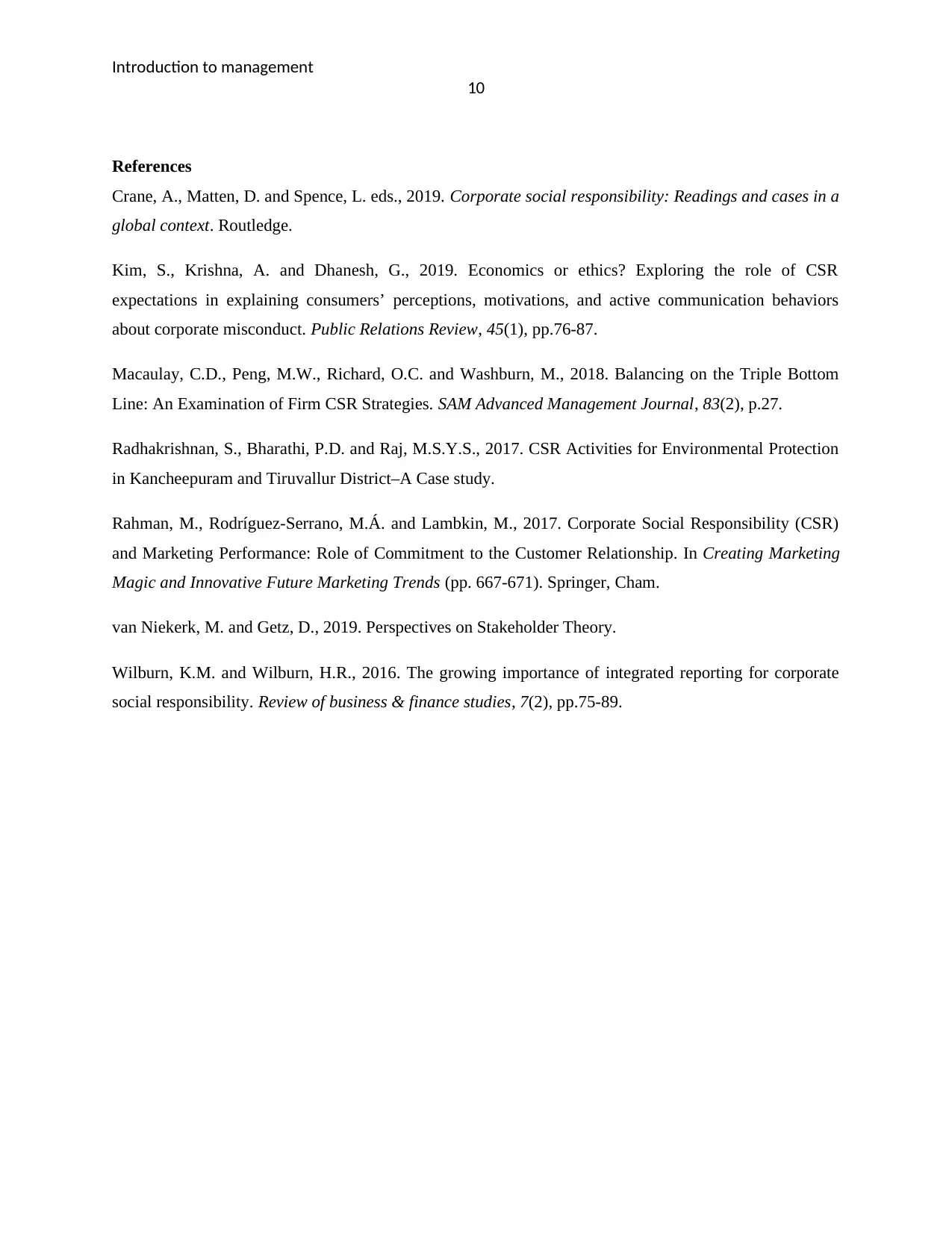
Introduction to management
10
References
Crane, A., Matten, D. and Spence, L. eds., 2019. Corporate social responsibility: Readings and cases in a
global context. Routledge.
Kim, S., Krishna, A. and Dhanesh, G., 2019. Economics or ethics? Exploring the role of CSR
expectations in explaining consumers’ perceptions, motivations, and active communication behaviors
about corporate misconduct. Public Relations Review, 45(1), pp.76-87.
Macaulay, C.D., Peng, M.W., Richard, O.C. and Washburn, M., 2018. Balancing on the Triple Bottom
Line: An Examination of Firm CSR Strategies. SAM Advanced Management Journal, 83(2), p.27.
Radhakrishnan, S., Bharathi, P.D. and Raj, M.S.Y.S., 2017. CSR Activities for Environmental Protection
in Kancheepuram and Tiruvallur District–A Case study.
Rahman, M., Rodríguez-Serrano, M.Á. and Lambkin, M., 2017. Corporate Social Responsibility (CSR)
and Marketing Performance: Role of Commitment to the Customer Relationship. In Creating Marketing
Magic and Innovative Future Marketing Trends (pp. 667-671). Springer, Cham.
van Niekerk, M. and Getz, D., 2019. Perspectives on Stakeholder Theory.
Wilburn, K.M. and Wilburn, H.R., 2016. The growing importance of integrated reporting for corporate
social responsibility. Review of business & finance studies, 7(2), pp.75-89.
10
References
Crane, A., Matten, D. and Spence, L. eds., 2019. Corporate social responsibility: Readings and cases in a
global context. Routledge.
Kim, S., Krishna, A. and Dhanesh, G., 2019. Economics or ethics? Exploring the role of CSR
expectations in explaining consumers’ perceptions, motivations, and active communication behaviors
about corporate misconduct. Public Relations Review, 45(1), pp.76-87.
Macaulay, C.D., Peng, M.W., Richard, O.C. and Washburn, M., 2018. Balancing on the Triple Bottom
Line: An Examination of Firm CSR Strategies. SAM Advanced Management Journal, 83(2), p.27.
Radhakrishnan, S., Bharathi, P.D. and Raj, M.S.Y.S., 2017. CSR Activities for Environmental Protection
in Kancheepuram and Tiruvallur District–A Case study.
Rahman, M., Rodríguez-Serrano, M.Á. and Lambkin, M., 2017. Corporate Social Responsibility (CSR)
and Marketing Performance: Role of Commitment to the Customer Relationship. In Creating Marketing
Magic and Innovative Future Marketing Trends (pp. 667-671). Springer, Cham.
van Niekerk, M. and Getz, D., 2019. Perspectives on Stakeholder Theory.
Wilburn, K.M. and Wilburn, H.R., 2016. The growing importance of integrated reporting for corporate
social responsibility. Review of business & finance studies, 7(2), pp.75-89.
1 out of 10
Related Documents
Your All-in-One AI-Powered Toolkit for Academic Success.
+13062052269
info@desklib.com
Available 24*7 on WhatsApp / Email
![[object Object]](/_next/static/media/star-bottom.7253800d.svg)
Unlock your academic potential
Copyright © 2020–2026 A2Z Services. All Rights Reserved. Developed and managed by ZUCOL.





